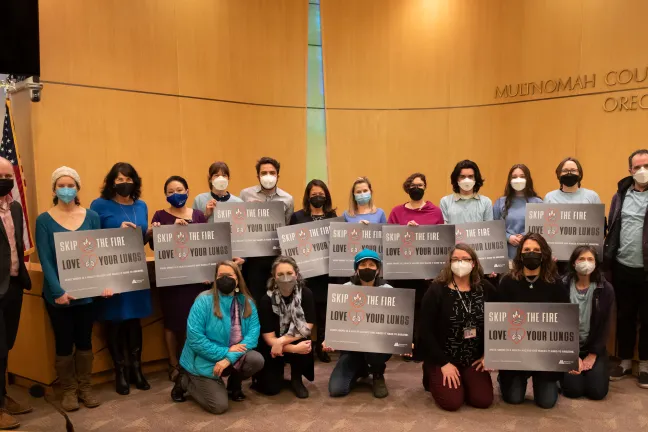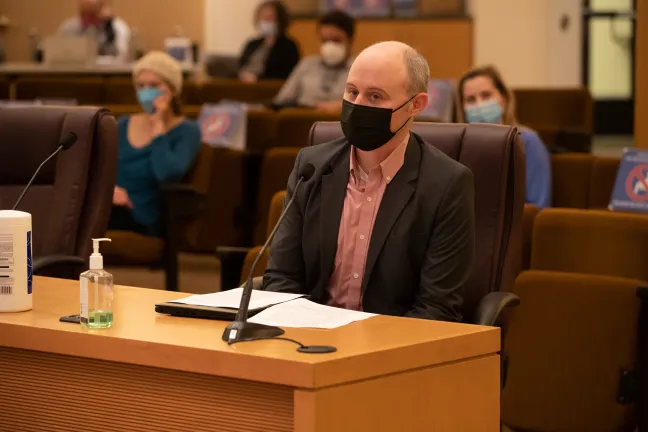The Board of Commissioners Thursday unanimously moved to strengthen the County’s wood smoke rules, seeking to further reduce residential wood smoke, the leading source of human-caused fine particulate pollution in Multnomah County.
The Board adopted an ordinance that updates the County’s 2018 wood smoke ordinance. The changes are based on recommendations by a Wood Smoke Policy Work Group convened by Commissioners Susheela Jayapal and Jessica Vega Pederson last year.
The new policy does three things:
- Simplifies burn advisories by removing the term “Green day.” People will be asked to avoid burning at all times, but the County will still post voluntary "yellow days" to alert people to worsening air quality, and on a “red’’ day people must not burn (with very limited exemptions).
- Extends the wood smoke surveillance season from five months to year-round.
- Eliminates an exemption for EPA-certified wood stoves.
The removal of EPA-certified wood stoves follows an assessment of the EPA certification program by air quality experts who found that the federal requirements were easy for manufacturers to manipulate and the EPA failed to provide either oversight or enforcement and amid an investigation into the program by the EPA’s own Office of Inspector General.
Exemptions remain for low-income residents and in situations where wood burning is the sole source of someone’s heat, for religious purposes, or during an emergency.
The vote comes on the heels of other Board action on wood smoke.
On Feb. 8, the Multnomah County Office of Sustainability and the Health Department’s Environmental Health program presented a menu of policy options developed by the 2021 workgroup, composed of public agencies, area nonprofits and businesses.
On Feb. 10, the Board passed a resolution that sets stricter goals for reducing wood smoke and commits the County to easing the burden of pollution on communities of color. The resolution puts Multnomah County, which has Oregon’s dirtiest air, in line with international benchmarks for pollutants that are less than half what the federal government currently allows.
“There are no good days to burn. But there are ‘worse’ days and ‘worst’ days,” Commissioner Jayapal said ahead of Thursday’s vote. “The actions we are taking require culture change, and we’re committed to working with communities to make that shift.”
Public Health Director Jessica Guernsey spelled out the health risks of wood smoke exposure, chief among them as contributing to cancer, heart disease, stroke and chronic lower respiratory disease, and worsening symptoms of asthma, diabetes and COVID-19.
And that risk is not felt equally.
“Gentrification has pushed and clustered people to areas where they bear a heavier burden,” Director Guernsey told commissioners. That’s why last spring, her office came before the Board to ask that it declare racism as a public health crisis.
“We know racism plays out in policies and environments. This is an example,” she said. “This work is desperately needed. We have an obligation — statutory and ethical — to protect public health.”
The County’s Healthy Homes and Communities program, within the Division of Public Health, will implement the updated wood smoke ordinance.
That office received 47 exemptions this year to the seasonal wood smoke ordinance, 16 of those for homes that had a federally certified wood stove.
Brendon Haggerty, who oversees the Healthy Homes and Communities program, said they would contact anyone who had an exemption on file to talk about the changes, and determine whether those 16 homes might fall under another existing exemption, which include:
- Low-income households
- Those for whom wood is the sole source of heat
- Burning during emergency conditions
- Burning when other sources of heat are temporarily not functioning
His team will also reevaluate the thresholds for calling voluntary and mandatory burn curtailments, based on anticipated changes to federal air quality standards scheduled to be released this summer. And central to implementing the new program will be increased communications and education around the risks of wood smoke.
Commissioner Lori Stegmann applauded the focus on education, which she said would be key to a successful policy, especially in her East County district which includes more rural communities such as Corbett.
And she thanked the Board for shaping its policies based on the whole community’s public health. “We have a pretty incredible board,” she said. “It’s an honor to be part of a board that cares so deeply about the racial inequities and the health of our community.”
Commissioner Vega Pederson said she has learned so much about the risks of wood smoke through this process, and what she has learned has indeed shaped her own behavior. She no longer has fires at home, and instead considers new ways to feel cozy.
“These are the types of shifts in our thinking that we need to make in order to build a community we want to live in," she said, “where everyone, every day, can enjoy clean, safe air. Every single day of the year.”
Commissioner Sharon Meieran said she loved the aspiration of clean air for all.
“This should be on a billboard or a lawn sign. Everyone, everywhere deserves to breathe clean air all the time. And it's up to us to keep pushing forward on this commitment to a healthy community."


